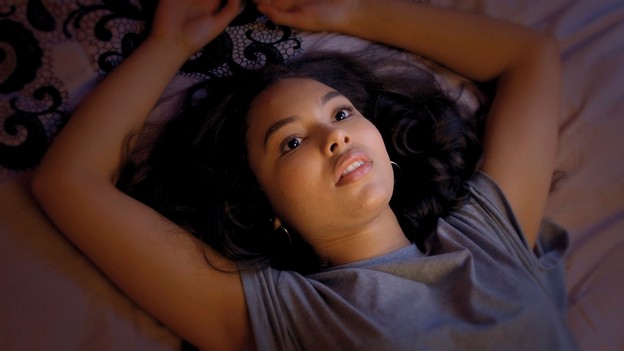Rebecca Johnson makes her feature-film debut with “Honeytrap” after a string of short-film successes, including the award-winning “Top Girl,” which played at more than 30 festivals internationally, including Berlin, Rotterdam and Los Angeles, and secured several awards before being picked up by Canal+. She is a Screen International Star of Tomorrow. “Honeytrap” premiered at the BFI London Film Festival where Johnson was duly nominated for the Best British Newcomer award. (Press materials)
“Honeytrap” will premiere at the 2015 SXSW Film Festival on March 13.
W&H: Please give us your description of the film playing.
RJ: “Honeytrap” is the story of 15-year old Layla, who is drawn into gang culture and ends up setting up the boy in love with her to be killed. It is my first feature film.
W&H: What drew you to this story?
RJ: Over the last decade, I have worked with young people in Brixton (South London), where I also live. I got to know girls who had become involved in gang culture, and of course lots of boys as well. It made me feel strongly that the portrayals in the press, depicting them as abject/monstrous, does them and society a disservice.
The problem of young people becoming involved in violence is caused by a whole range of factors, including poverty, deprivation, lack of parental and social support, and also, I believe, our increasingly status-obsessed society where to be rich, desirable, and famous is perceived as everything. And if you are not those, you are nothing — and these kids are already being given the message that they are nothing from the fact that they are at the bottom of the social heap. I am also concerned about the way I have seen young girls portrayed as femme fatales in press coverage of these cases, which is part of the way girls, even as children, are sexualized in the media generally.
W&H: What was the biggest challenge in making the film?
RJ: I wanted to tell the story of a girl who acted as a “honeytrap” without exploiting her for sensationalist effect. I wanted to make you see the world through her eyes. The film was made on next to nothing, so there were many challenges in making it. But ultimately, the biggest overall challenge for me was to deliver on my intention: to do the story justice and to make a film where I succeeded in taking the audience on a journey with Layla, the main character, so that they were unable to distance themselves from her even as she descended into darker and darker moral territory.
W&H: What do you want people to think about when they are leaving the theatre?
RJ: I hope that people are feeling a whole range of emotions and examining them, trying to unpack them.
W&H: What advice do you have for other female directors?
RJ: I would advise a female director to make their first film independently and not wait for financing to come through an established body. The stats are clear: female filmmakers are much less likely to get financed. That will probably mean making it on a horribly low budget, but at least you will have creative control of your vision. Being a filmmaker is about making things happen and driving things into existence. There will be a million naysayers along the way, and often the only way to make them understand that something can work is to show them.
W&H: What’s the biggest misconception about you and your work?
RJ: I like stories about underdogs, and I like female-led stories. I imagine that people may see me as very much a storyteller linked to the urban world in which “Honeytrap” is set, but in fact I am more interested in telling stories that work with these themes than in sticking to this setting.
W&H: How did you get your film funded? Share some insights into how you got the film made.
RJ: We made the film on a wing and a prayer! We did a couple of crowdfunding campaigns, one of which attracted our UK distributor, and there were a couple of private investors who also came on board. The film was shot and edited independently, but then the BFI (British Film Institute) came on board to help us finish it with Completion Funding.
W&H: Name your favorite woman-directed film and why.
RJ: “The Piano” by Jane Campion: it’s huge and wonderful and sweeps you up into an emotional maelstrom. The characters are all fantastically well drawn, as are the oppressive conventions bearing down on them. Ada and her daughter, and indeed her tragically insecure husband, are tightly confined and corseted by social rules, despite being in this wild, epic landscape — a contrast which of course reflects the absurdity and wrongness of the imposing colonial force as well as a suppression of the feminine. Michael Nyman’s score is perfect in it too. It is a truly great and truly iconic film.






